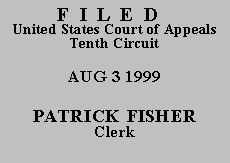

| UNITED STATES OF AMERICA, |
|
Before BRORBY, EBEL, and
LUCERO, Circuit Judges.
After examining the briefs and appellate record, this panel has determined
unanimously that oral argument would not materially assist the determination of
this appeal. See Fed. R. App. P. 34(a)(2); 10th Cir. R. 34.1(G). The case is
therefore ordered submitted without oral argument.
Appellant Carlos Mora-Peralta appeals the two- to three-year term of supervised release imposed by the district court at sentencing. We exercise our jurisdiction under 28 U.S.C. § 1291 and affirm.
The government indicted Mr. Mora-Peralta for illegal reentry after deportation in violation of 8 U.S.C § 1326. At the same time, the government filed a notice of sentencing enhancement under 8 U.S.C. § 1326(b)(2), requesting the district court enhance Mr. Mora-Peralta's sentence based on his prior conviction for an aggravated felony, thereby increasing his maximum term of imprisonment to twenty years. Following Mr. Mora-Peralta's guilty plea, the district court applied the enhancement under 8 U.S.C. § 1326(b)(2) based on his prior conviction, and sentenced him to 46 months in prison and a two- to three-year term of supervised release in conformance with the twenty-year maximum term of imprisonment.
On appeal, Mr. Mora-Peralta claims the district court improperly calculated his term of supervised release. While Mr. Mora-Peralta agrees the maximum term of imprisonment must be used to calculate the term of his supervised release, he suggests the maximum term of imprisonment must be premised solely on the base offense for which he was convicted, without any enhancement for prior convictions. Because the unenhanced, maximum sentence for reentry after deportation is only two years, he asserts his offense is a Class E felony subjecting him to only a one-year term of supervised release, rather than a Class C felony subjecting him to a three-year term of supervised release.
Generally, we review the district court's factual findings for clear error and its interpretation of the Sentencing Guidelines de novo. See United States v. Flores, 149 F.3d 1272, 1279 (10th Cir. 1998), cert. denied, 119 S. Ct. 849 (1999). However, because Mr. Mora-Peralta did not object to the term of supervised release prior to or at sentencing, we review the district court's challenged interpretation of the applicable statutes for plain error, see United States v. Farnsworth, 92 F.3d 1001, 1007 (10th Cir.), cert. denied, 519 U.S. 1034 (1996); see also Fed. R. Crim. P. 52(b).
By statute, the term of any supervised release is based on the maximum term of imprisonment authorized for the offense committed. See 18 U.S.C. §§ 3559(a) & 3583(b); U.S.S.G. § 5D1.2(a). The United States Supreme Court has interpreted "maximum term authorized" to "include all applicable statutory sentencing enhancements." United States v. LaBonte, 520 U.S. 751, 753 (1997). In applying this definition to sentencing determinations, the Supreme Court has concluded that "[w]here Congress has enacted a base penalty for first-time offenders or nonqualifying repeat offenders, and an enhanced penalty for qualifying repeat offenders, the 'maximum term authorized' for the qualifying repeat offenders is the enhanced, not the base term." Id. at 759.
Under the sentencing statutes at issue in this case, the maximum term of imprisonment authorized for illegal reentry of a deported alien is two years, unless the deportation was "subsequent to a conviction for commission of an aggravated felony," in which case, the maximum term of imprisonment authorized is "not more than 20 years." 8 U.S.C. §§ 1326(a)(2) & (b)(2). Because Mr. Mora-Peralta's removal from the country followed his conviction for an aggravated felony, it is clear his maximum term of imprisonment under the applicable statutory sentencing enhancement, 8 U.S.C. § 1326(b)(2), is twenty years. An offense with a maximum term of imprisonment of twenty years is classified as a Class C felony under 18 U.S.C. § 3559(a)(3), and the length of supervised release for a Class C felony is "not more than three years," 18 U.S.C. § 3583(b)(2); see also U.S.S.G. § 5D1.2(a)(2). Under these circumstances, the district court did not err in sentencing Mr. Mora-Peralta to a two- to three-year term of supervised release.
For the foregoing reasons, the sentence of the district court is AFFIRMED.
Entered by the Court:
WADE BRORBY
United States Circuit Judge
*. This order and judgment is not binding precedent except under the doctrines of law of the case, res judicata and collateral estoppel. The court generally disfavors the citation of orders and judgments; nevertheless, an order and judgment may be cited under the terms and conditions of 10th Cir. R. 36.3.